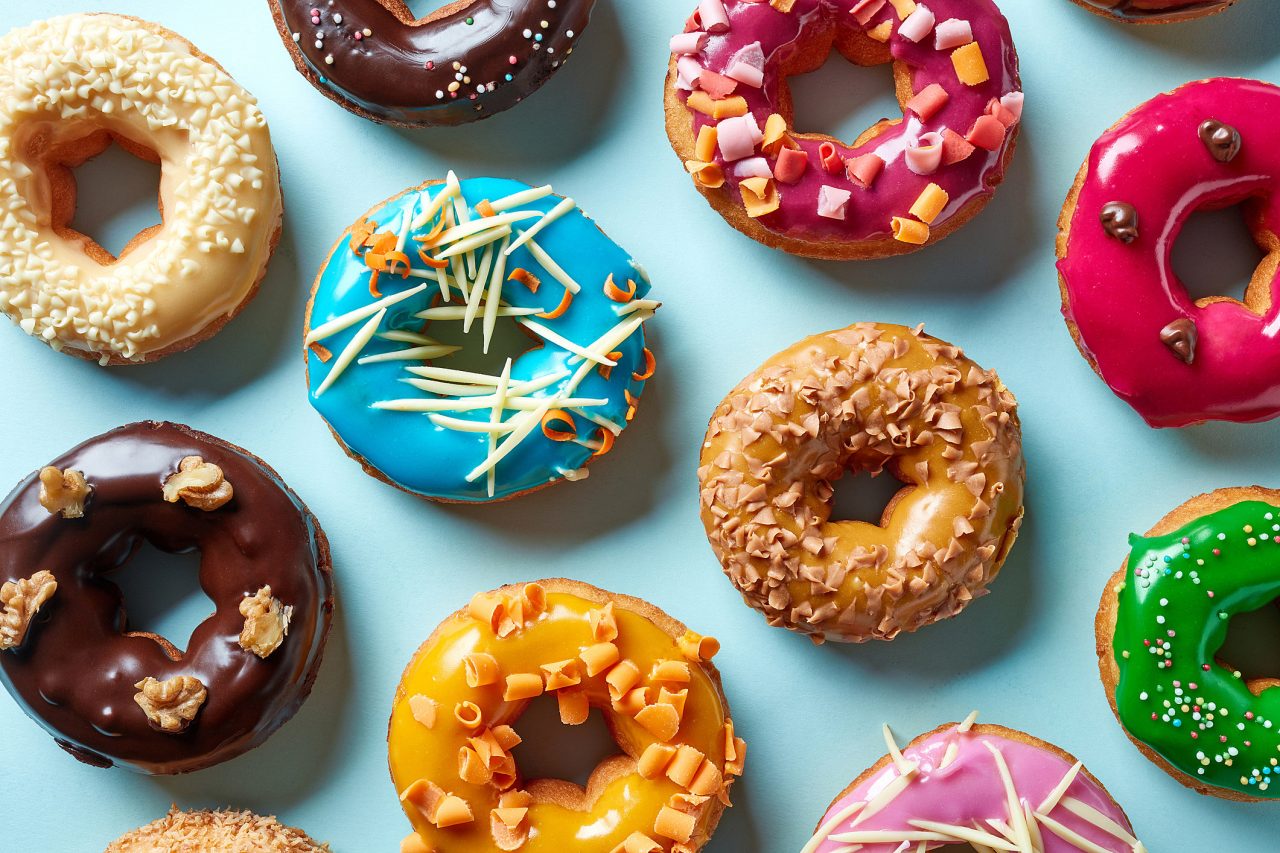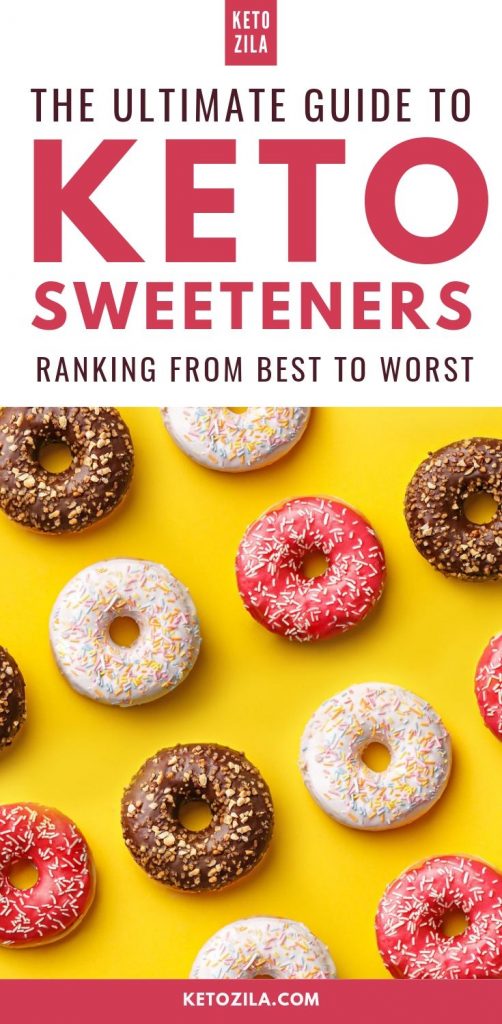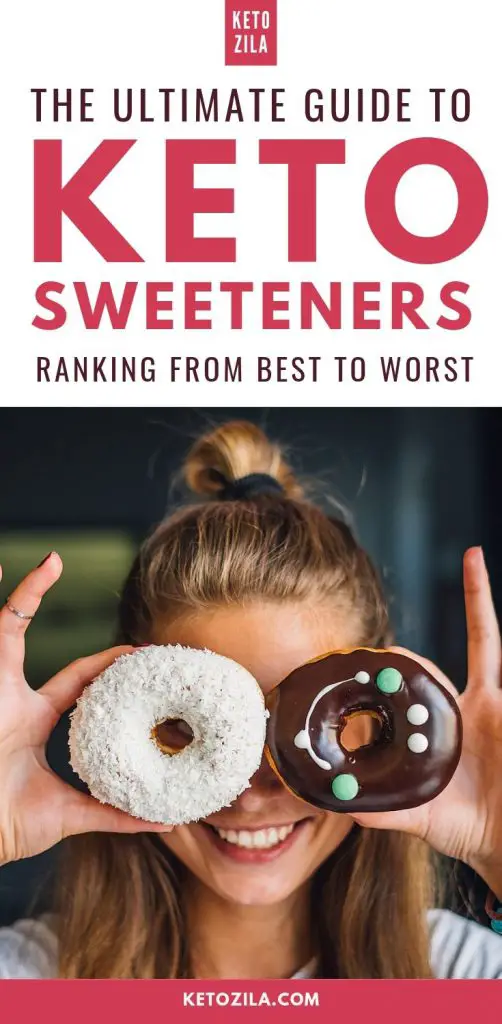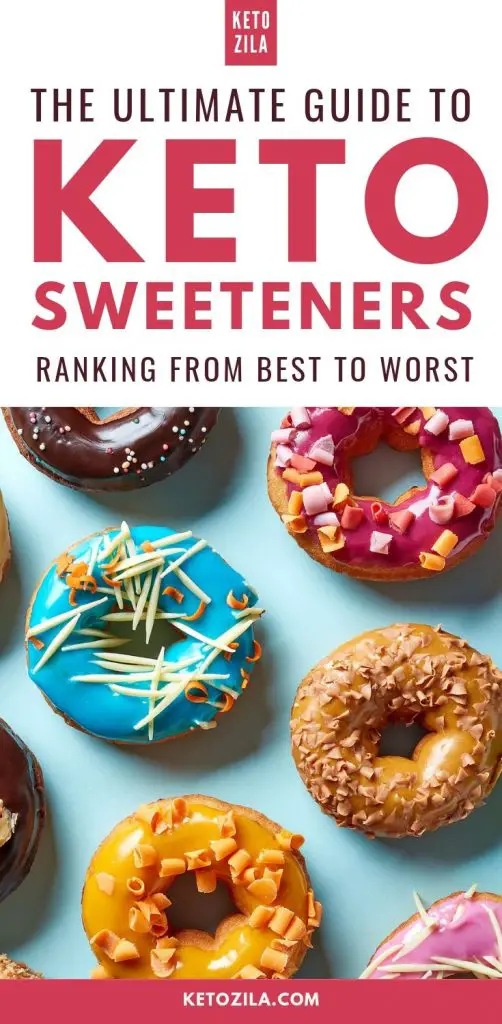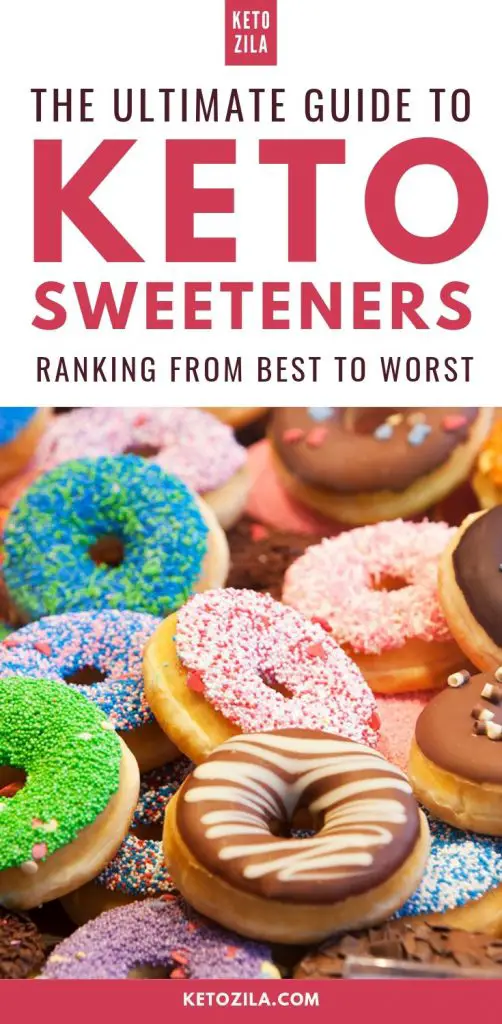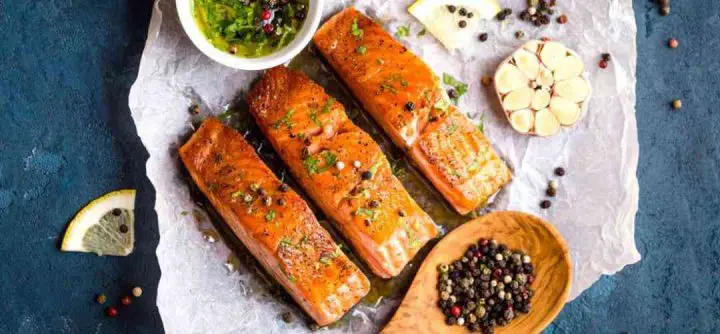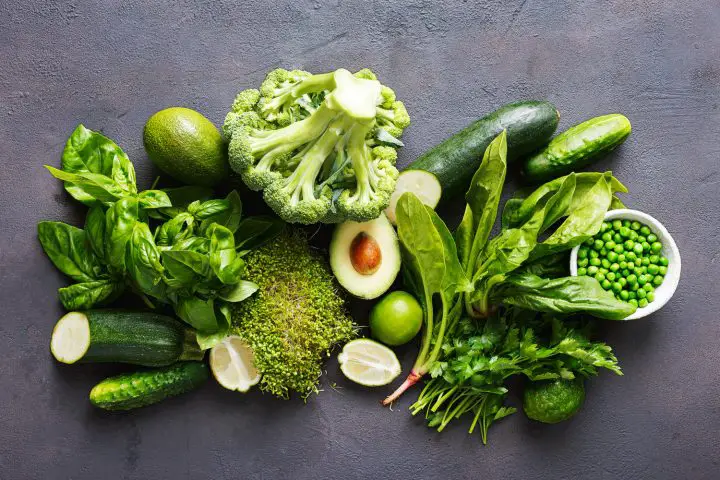Can sweeteners be used safely on a keto diet? Maybe, if you’re making smart choices. This guide is going to help you make the right choices on your sweeteners.
To the left is the green zone which contains the very low-carb sweeteners and are generally viewed as having little effect on insulin levels, blood sugar, and/or weight gain.
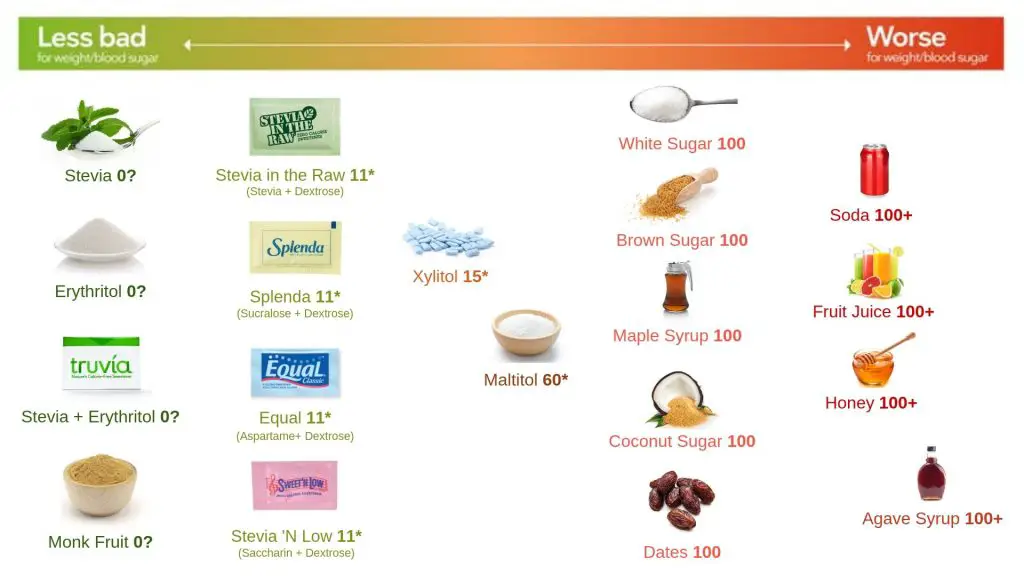
The numbers matching to each sweetener reflect the projected long-term impact on insulin and blood sugar levels of each product relative to the same level of white sugar sweetness. Pure white sugar is classified as having a rating of 100 for the purpose of this scale.
Items that are rated with 0 and has a question mark means that the rating is only based on what is currently known about its impact on insulin and blood glucose response. These sweeteners are relatively new and their full effect on health and long term risk for cardio and metabolic diseases are not yet fully known. Further research is needed on such products.
Products with asterisk numbers highlight the fact that some carbs are contained in these products, in certain cases as fillers (usually dextrose). For instance, a Splenda packet produces almost the same sweetness as two sugar teaspoons, which is equivalent to 8 grams of sugar. The packet has approximately 0.9 grams of carbohydrate in the form of glucose. For an equivalent amount of sweetness, that’s 0.9/8= 0.11 times the calorie content of sugar. Pure 100% dextrose has a rating of 100, thus Splenda gets 11 (100x 0.11).
The maltitol and xylitol asterisks reflect that, although reduced, these sweeteners will still induce an insulin and blood glucose response.
If you’re trying to remain in ketosis, avoid the red zone and middle tier sweeteners. If you need sweeteners, use stevia or erythritol – although their long-term health effects are not yet fully known.
Beware of the Sweetener Trap

As mentioned, the sweeteners on the left might only have minimal or even neglible direct effects on blood-sugar levels and weight. This is not the only concern, however.
Consuming sweet-tasting foods and drinks can make you crave for more sweet-tasting foods or treats. Cravings are not eliminated when eating sweet treats – they’re kept and coddled.
Even non-calorie sweeteners, such as erythritol and stevia, are usually added to foods to replace or imitate the foods eliminated by the keto diet — sugary soft drinks, cakes, cookies, muffins, pastries, ice creams, sweets, dessert bars, energy bars, and more. Though these foods don’t contain carbs, they still tend to induce snacking and excessive consumption of sweet foods.
These sweet treats are usually eaten even when not hungry, which dramatically raises the risk of eating more than you need.
They also keep you tied up with your old habits of your high-carb diet, such as rewarding yourself with sweet foods – a behavior that often contributes to metabolic issues and weight gain in the first place. They may slow down your weight loss progress or even cause weight gain even while on a keto diet. They can also trigger a relapse to your old non-keto, high-carb eating.
Even diet soft drinks which uses zero calorie sweeteners can also contribute to long-term metabolic issues and weight gain problems. All sweet flavors, whether sugar substitutes or real sugar, act on the same sweet receptors of the tongue and trigger identical brain neural reward pathways which reinforces the intake of even more sweets. This can lead you to an endless trap of sugar cravings and addictions.
However, we do understand that most people feel that they need to have a sweet treat every once in a while. For some, celebrating a birthday without ice cream and cake might take away some happiness from their lives. An occasional sweet treat – particularly one made with erythritol, monk fruit, or stevia – may make it much easier to maintain the keto diet.
Luckily, the keto diet reduces most people’s cravings for sweet-tasting foods over time. Ignoring or controlling cravings becomes easier while the longing for sweets diminishes. Many then learn to enjoy the natural sweet taste of unprocessed healthy foods. Tastebuds can adapt to subtle and rewarding flavors. The need and cravings for sweeteners will start to ease down eventually.
However, if still want to indulge with sweet treats occasionally, then here are some tips so you can make better choices when it comes to your sweeteners.
Use of Sugar as Sweetener
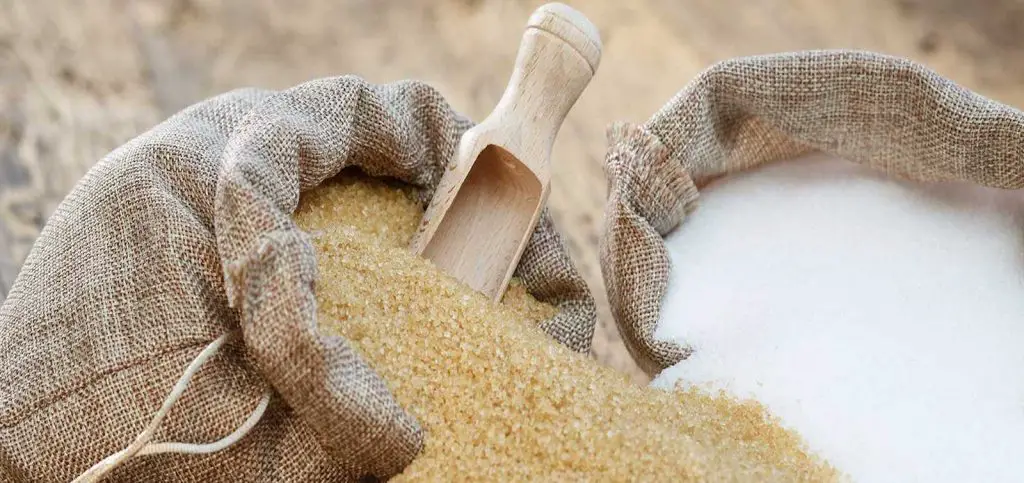
Sugar comes in many forms: white, brown, date sugar, coconut sugar, maple syrup, confectionary, icing, demerara, and more.
Real sugar consists of a double molecule of fructose (50%) and glucose (50%). This makes sugar a 100% carb, all of which have the same (bad) impact on insulin response, blood glucose, and weight gain.
On a keto diet, sugar is strictly avoided in all its forms since it will derail your progress. Treat it as poison.
Worse Than Sugar: 100% Pure Fructose
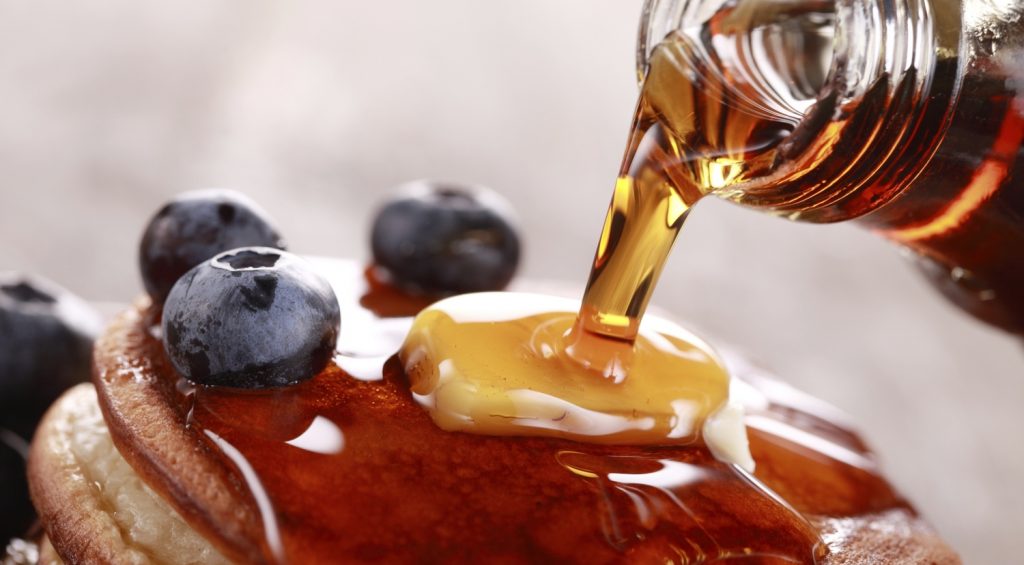
Fructose is worse than sugar. The reason is because it goes directly to the liver and it might even promote unhealthy lipid profiles, central obesity, insulin resistance, and fatty liver, especially when eaten in excessive amounts.
Even though fructose has a lower glycemic index rating and are much slower to raise blood sugar than pure sugar, it can still cause a lot of metabolic harm – worse than pure sugar!
These deadly fructose sweeteners – agave syrup, molasses, honey, fruit juice concentrate, high fructose corn syrup – are rated 100+ because of their long-term detrimental impact to health. The worse of all these fructose sweeteners is the agave syrup since it has the highest fructose content (higher than 60%). ⠀
Fructose sweeteners are totally prohibited while on a keto diet.
No-Calorie Sweeteners
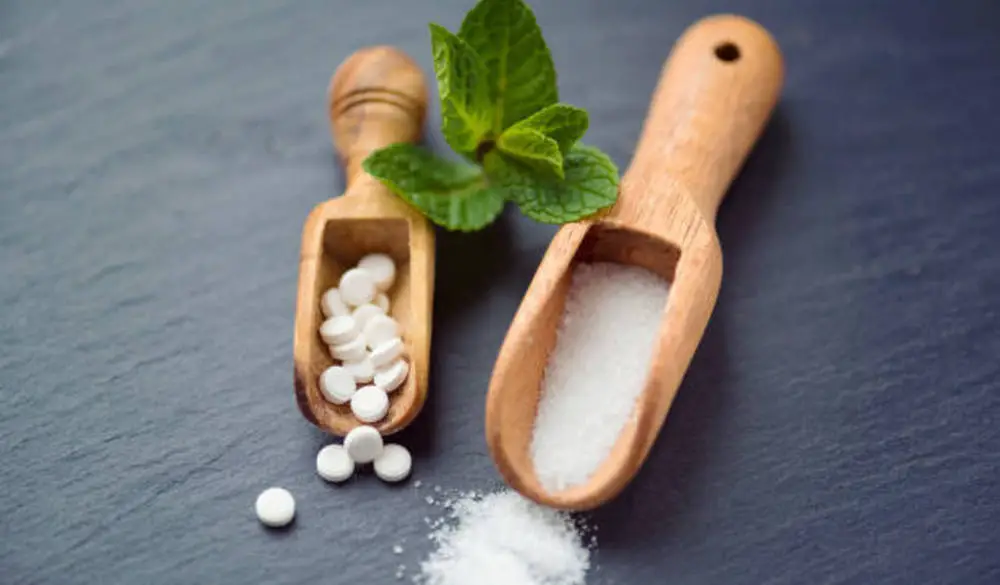
We now all know that sweeteners have potential negative impacts especially on one’s metabolism and cravings. However, if occasional consumption of sweets can help you to sustain the keto-diet on long term, then here are the top 3 choices that may incur the least damage.
1. Stevia
Stevia is extracted from the leaves of the plant Stevia rebaudiana from South America. Native people in Brazil and Paraguay used these intensely sweet leaves in their medicines and teas. They also chew on them like a sweet gum.
Pros
- It has no carbs and no calories.
- It does not raise insulin and blood sugar levels.
- It has a low potential for toxicity and appears to be safe.
- Stevia is at least 200 to 350 times the sweetness of sugar – a little amount is often enough.
Cons
- It doesn’t taste like sugar even though it is intensely sweet.
- Most people find that is has a bitter after taste.
- It cannot be simply swapped into existing recipes that uses sugar and get similar results.
Sweetness
200 – 350 times sweeter than regular table sugar.
Products
Stevia can be purchased as granulated, powdered, or liquid. Some stevia products in granulated form such as Truvia also contain erythritol and fillers.
2. Erythritol
Erythritol is a sugar alcohol made from fermented cornstarch or corn. The intestinal tract can only partially absorb erythritol so it may cause gastrointestinal problems for some people.
Pros
- It has no carbs and no calories.
- It does not raise insulin and blood sugar levels.
- The body does not use its active compound as it only passes into the urine.
- It is easy to use as sugar recipe replacement in its granulated form.
- It can prevent dental plaque and cavities.
Cons
- It has a minty sensation on the tongue so it doesn’t have the same feel on the tongue as sugar.
- It may cause, diarrhea, gas, and bloating for some people.
Sweetness
70% of regular table sugar.
Products
Granulated or mixture of stevia and erythritol.
Monk Fruit
Monk fruit is a comparatively new sugar substitute even though it has been derived from a fruit that has been grown for decades specifically in Southeast Asia. It was generally used as herbal tea, soup, and medicine broths. These were cultivated by monks in Southern China and Northern Thailand – thus the name “monk fruit”.
Monk fruit is 250 times as sweet as sugar. Its intense sweetness comes from non-caloric compounds called mogrosides which makes it a good candidate for sugar replacement.
Pros
- It does not raise insulin and blood sugar levels.
- It has a better taste than stevia. (less bitter after taste)
- It does not cause gastrointestinal problems unlike other sweeteners.
Cons
- Expensive.
- Most monk fruit products are mixed with fillers like prebiotic fibers, inulin, and other ingredients.
- Some products indicates “property blend” which contains very little mogroside ingredients.
Sweetness
250 stronger than sugar.
Products
Granulated form mixed with erythritol or stevia, liquid drops.
Low Carb Sweetener: Xylitol
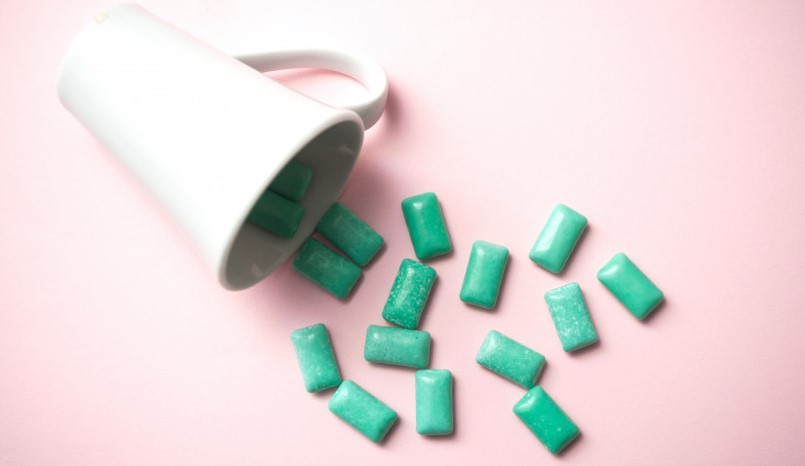
Xylitol is the most common sugar-free sweetener in commercial mouthwashes and sugar-free gums.
It is a plant-based sugar alcohol just like erythritol and it is manufactured commercially through a multi-step chemical extraction method from the woody, fibrous parts of birch trees or corn cobs. The end product is a granular sugar-like crystal, but it is not sugar.
Xylitol contains small amounts of carb, but it is not totally zero carb. This is not a great option while on a keto diet because xylitol’s carbs can add up quickly if you don’t track it carefully.
Pros
- Xylitol has a low GI index rating of 13 and only half of it is being absorbed by the small intestine.
- It has an insignificant impact on insulin and blood sugar levels when used in small quantities.
- It has the same taste as sugar, but only contains half the calories.
- Unlike other sweeteners, it can replace sugar in recipes 1 is to 1.
- It can help avoid cavities when chewed in gums.
Cons
- It can cause severe digestive upset (diarrhea, bloating, gas) even when eaten in low amounts.
- It is extremely toxic to dogs and other pets – even just a tiny bite of a product that contains xylitol can be deadly to dogs.
Sweetness
Same with regular table sugar.
Product
Granulated organic xylitol made from the extraction of birch wood.
Beware of Deceitful “Zero Calorie” Sweeteners
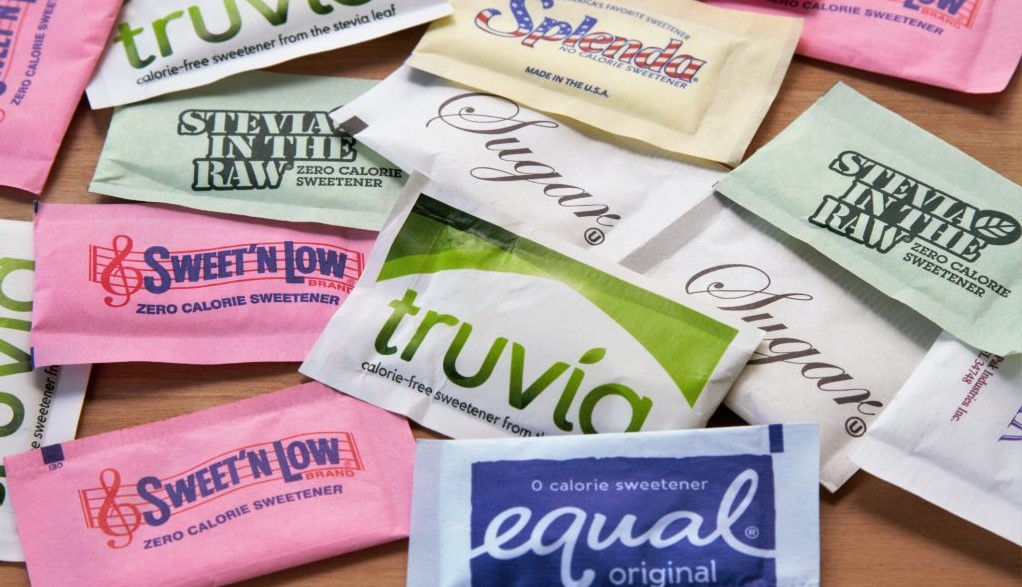
Do you know that some sweeteners labeled as “zero-calorie” contains almost 100% carbs?
Beware of Splenda, Sweet’n Low, Equal, and Stevia in the Raw packets. They contain misleading labels such as “zero calories”, but they’re not.
The “zero calories” label is allowed by the FDA for products with less than 4 calories and less than 1 gram of carb per serving. Deceitful manufacturers are therefore cleverly packaging about 0.9 gram of pure carbs (dextrose / glucose) mixed with a small amount of a more potent artificial sweetener.
This will then enable them to label the packets as “zero calories” to make it look attractive to consumers while still satisfying the FDA standards. In reality however, the packets contains almost a gram of carbs or almost 4 calories each. That can really add up quickly especially when on a keto diet. Don’t be fooled and don’t ever buy such products.
Maltitol: Just as Bad as Sugar
Maltitol is a sugar alcohol that is made from the hydrogenation of maltose, a by-product of corn-syrup. It has very similar properties with pure sugar when being cooked and produced so it is a very popular ingredient in commercial “sugar free” items, such as desserts, candy, and other low-carb products. It is also cheaper for manufacturers to use than xylitol, erythritol, and other sugar alcohols.
Maltitol contains three-fourths the calories of sugar. It is not recommended to consume maltitol while on a keto diet. It is known to increase both insulin response and blood sugar levels. Anyone with pre-diabetes or diabetes should avoid consuming it.
It’s a powerful laxative as well. Although 50% of it is metabolized in the small intestine, the remaining 50% ferments in the large intestine. Findings have also shown that maltitol may cause severe gastrointestinal problems (diarrhea, bloating, gas etc.) even when eaten in moderate amounts.
Sweetness
75% as sweet as regular table sugar.
Can You Drink Diet Softdrinks While on Keto?

We recommend that you avoid diet softdrinks regardless if you are in a keto diet or not. Drink coffee, tea, sparkling water, or water instead.
As mentioned at the beginning of this article, frequent consumption of sweets, even without calories, will maintain your cravings for sweet tastes and it will make it harder for you to lose weight. Your taste buds will remain trapped to sweet flavors and less likely to learn to appreciate the natural, flavorful but less intense sweetness of healthy, unprocessed keto foods.
Most of the artificial sweeteners used on diet drinks such as sucralose, acesulfame K, and aspartame are also linked to health risks.
However, unlike regular sodas, you will still likely remain in ketosis if you drink diet sodas due to the absence of carbs. Still, you would not want to drink them (regular or diet) due to their detrimental impact on your cravings and metabolism.
Conclusion on Keto Sweeteners
It’s pretty obvious that we don’t encourage the use of sweeteners. Although some sweeteners might be better than others, teaching yourself to enjoy real healthy foods in their unsweetened state is the best strategy to achieve weight loss and optimal health.
A recent study has found that most positive research regarding sugar substitutes are funded by the same companies that are using them. Thus, they are full of unreproduced findings, research bias, and conflict of interest.
Adapting your taste palates may take some time, but over time, you may learn to enjoy the subtle sweetness of unprocessed, natural foods.
Pinnables
Share this article by pinning one of the pinnables below under your Keto Diet board!

